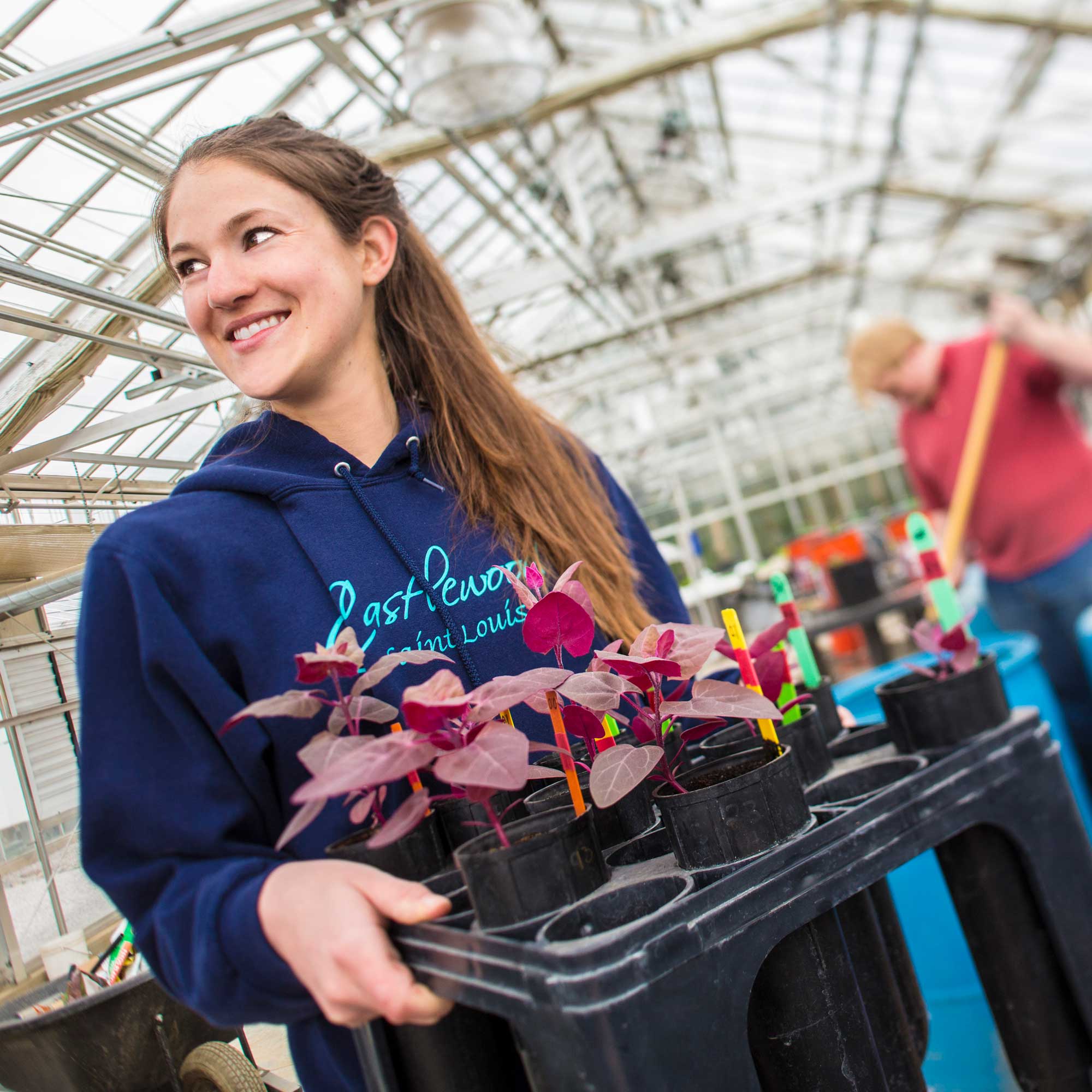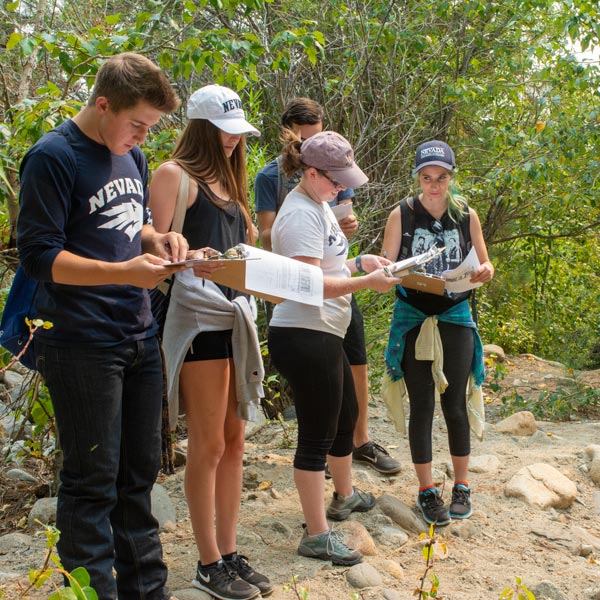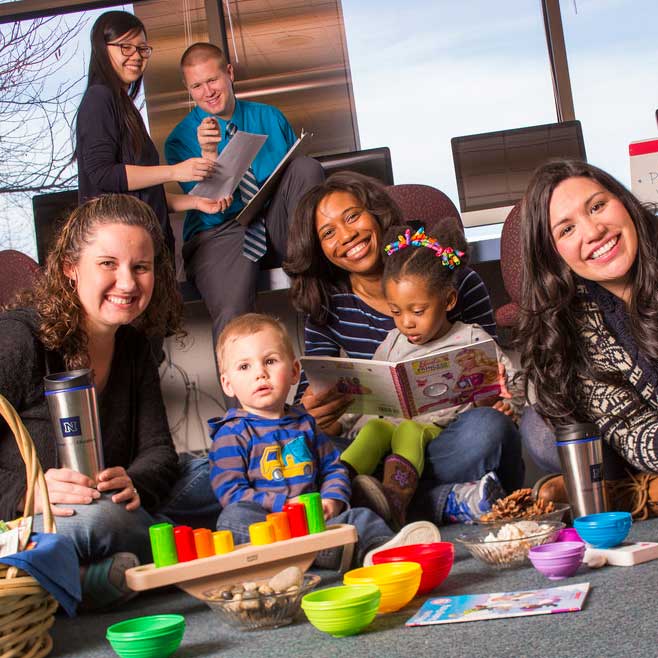About our College
A founding college of the University, we have a long tradition of excellence in teaching, research and engagement programs that benefit the health and economic vitality of Nevada. We offer programs in:
- agriculture, horticulture, rangeland and veterinary sciences
- biochemistry and molecular biology
- children, youth and families
- community and economic development
- health and nutrition
- natural resources and environmental science
Welcome home Wolf Pack!
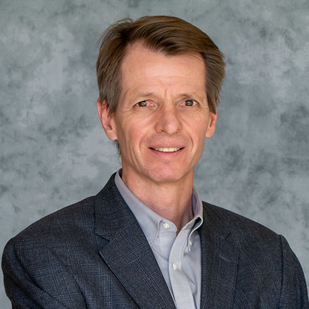 Associate Dean of Academic Affairs Claus Tittiger.
Associate Dean of Academic Affairs Claus Tittiger.Welcome – or welcome back, as the case may be – to the University and our College! It’s great to have campus fully open again. Many of you have struggled with the pandemic, and though we are not out of it yet (a mask requirement is in effect as I write this), we will return to normal operations this fall. Classes and labs will look more like “normal,” our College's Student Center and lounge is open again, and other aspects of campus life are returning – so get involved!
Continuing or resuming your academic progress now is the right decision. Our College has been working to help as much as we can. We are finalizing the distribution of nearly $180,000 in scholarship support this year. We also launched an emergency relief fund last January that has distributed $50,000 in aid so far, and which will continue this fall. Watch for email announcements for more opportunities and be sure to complete your FAFSA application when it is available starting Oct. 1.
Please keep an eye out for announcements from our College's Student Center as they launch fall academic advising campaigns. Freshmen and sophomores – you’ll need to meet with an advisor to enroll for spring classes. Juniors and seniors – schedule a grad check to ensure you’re on track to graduate. If you have any questions, just email our College's Student Center.
Again – welcome to the 2021-2022 academic year! I wish you all the best academic and college experience possible. Get involved, remember that help is always available, and stay well.
Go Pack!
Get involved
Learn about scholarship support
Making college accessible
Through the generosity of our many donors and supporters, our College has the ability to award over $175,000 in undergraduate and graduate scholarships annually. Students in the College will be considered for all merit and need-based scholarships and be selected for nomination by a committee of College faculty representing each department.
Kickoff to Kindergarten fair returns to prepare young children for school readiness
Extension hosts back-to-school family pre-k event with community partners
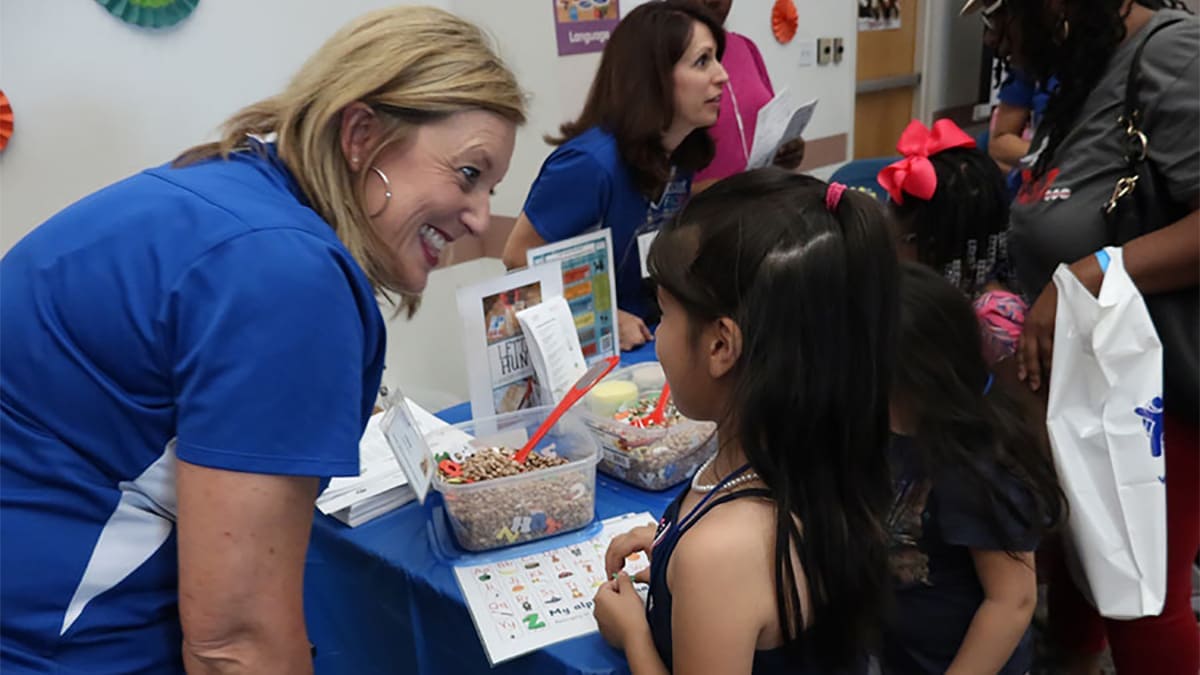
A young girl enjoys a hands-on learning activity at a previous Kickoff to Kindergarten event.
Extension is partnering with Las Vegas-Clark County Library District to host the sixth annual Kickoff to Kindergarten fair Aug. 21, from 10:30 a.m. to 1 p.m., at the East Las Vegas Library, 2851 E. Bonanza Road in Las Vegas. The event is free and open to the public, and backpacks with school supplies will be given to the first 200 families.
“We are so excited that we will be back to an in-person event this year,” Yae Bin Kim, Extension associate professor, said.
Preparing parents and children for a better future
“This event highlights all different readiness activities, and we have many resources and materials for families that help improve school-readiness skills from home. This is all possible thanks to all our wonderful partners.” -Associate Professor Yae Bin Kim
New Living With Fire podcasts dig deeper into today’s wildfire challenges
Extension continues outreach efforts to help residents better understand and live more safely with wildfire
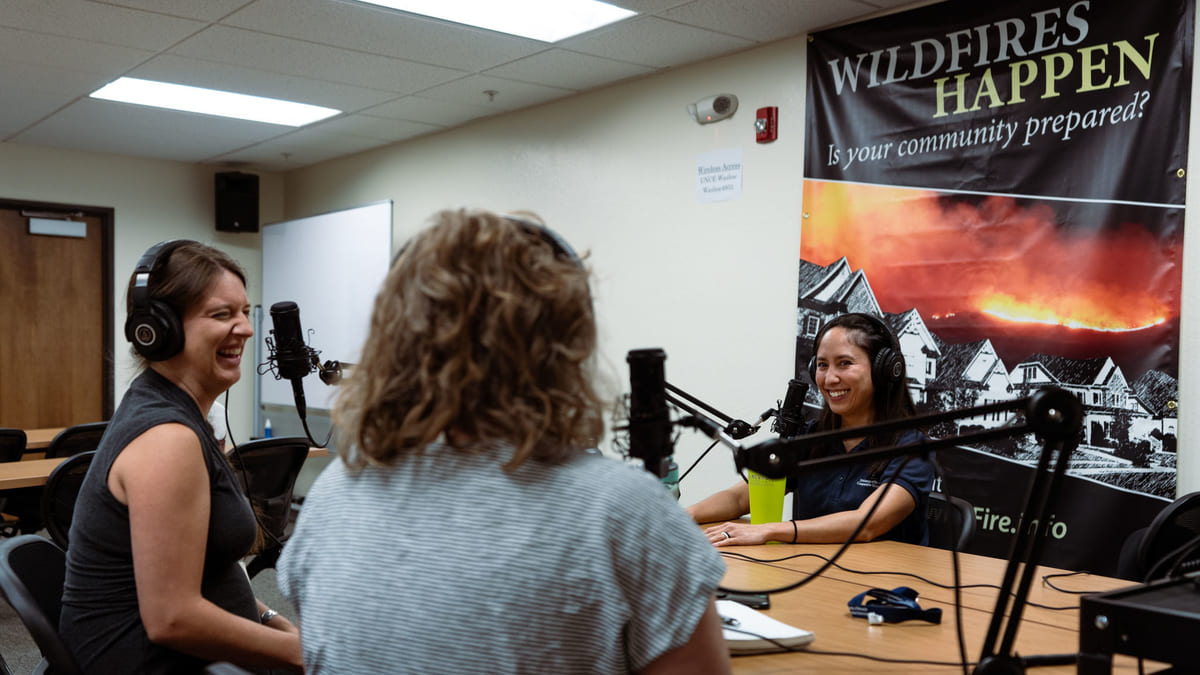
Extension Living With Fire team members (left to right) Megan Kay, Christina Restaino and Jamie Roice-Gomes record the second episode of the new Living With Fire Podcast. Photo by Jordan Buxton.
A new podcast from Extension's Living With Fire Program seeks to dig deeper into the issues surrounding the West's wildfire challenges, share personal accounts from those who have battled the fires and those who have been impacted by them, and provide insight from those who research the topic and try to manage our lands and wildfires to prevent catastrophic loss of lives and property.
The first two podcast episodes are available now.
- Episode 1: How did we get here? The History of Wildfire in Nevada - Brad Schultz, professor and Extension educator in Humboldt County, discusses the role of fire in Nevada, historically. As an expert in rangeland management, he has looked at wildfire from a “big picture” perspective across the state and across the West.
- Episode 2: Living With Fire - Members of Extension’s Living With Fire Program team give their perspectives on what it means to live with fire, and talk about some of the innovative ways the program and its partners are expanding the program, not only into the airwaves with the podcasts, but also in the schools, for example.
Future episodes include Fire Management in Nevada, Cultural Fire on Washoe Lands, Stories From Nevadans Impacted by Wildfire, Fire Ecology in Nevada, Perspectives From Wildland Firefighters.
Preparing Nevadans to prevent catastrophic loss
“We have to be prepared for wildfire because it exists here and it’s a part of the landscape and the history. I think that these stories in the podcast help to paint that entire picture.” -Assistant Professor Christina Restaino
Researcher aims to get to the bottom of harmful, hidden riverbed algae
University researcher to create predictive models to better protect pets and humans
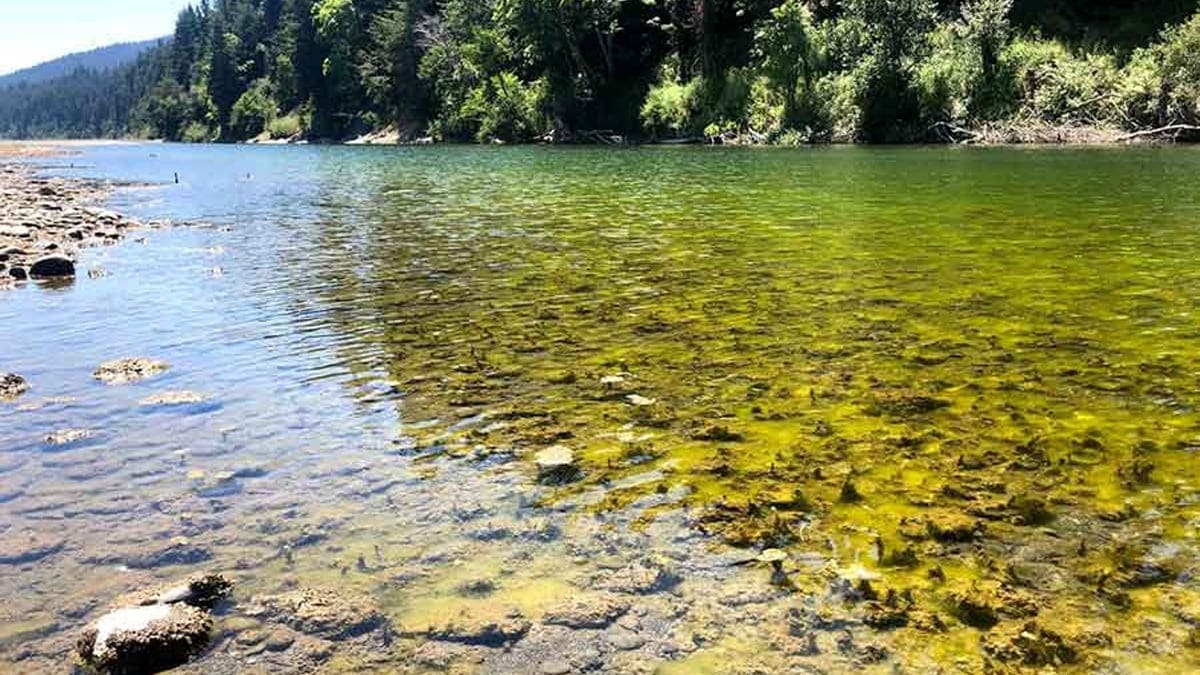
Cyanobacteria grows on the riverbed of the Eel River. Photo by Joanna Blaszczak.
Riverbed blue-green algae, referred to as “cyanobacteria,” can create algal blooms that produce toxins harmful to aquatic life, pets, livestock and humans.
Assistant Professor Joanna Blaszczak, with our College and its Experiment Station unit, is conducting research to identify the specific conditions conducive to producing these blooms and their toxins, so that water managers can know when they are going to occur and take actions to better protect animals, humans and river ecosystems.
Blaszczak hopes to keep people and their animals safe and inspire students to take an interest in studying science and their local rivers.
“We’ll bring students to one of the field sites and go through and explain some of the work we are doing and provide them the opportunity to get some hands-on experience sampling a riverbed,” she said. “We’ll have them understand where the harmful algae are, what they look like, and what we are doing. It’s an opportunity to get high school students excited to learn about science, and what’s going on in their own river networks.”
Ensuring healthy rivers, people and pets
“Besides keeping dogs and other animals safe, I’m concerned for people and the river ecosystems. I was driving by the Eel River, and you could just see the algal blooms on the river rocks. And 30 feet downstream, there were all these children playing in the river.” -Assistant Professor Joanna Blaszczak
Innovating for Nevada
Our programs work together to make an impact
Our teaching, research and engagement programs are intertwined and complement one another. Faculty who teach on campus also conduct research as part of our Experiment Station, allowing students to learn about and participate in research. Extension faculty engaging with communities identify research needs, as well as join Experiment Station faculty to conduct research. Faculty on campus help to develop Extension programs in communities.
